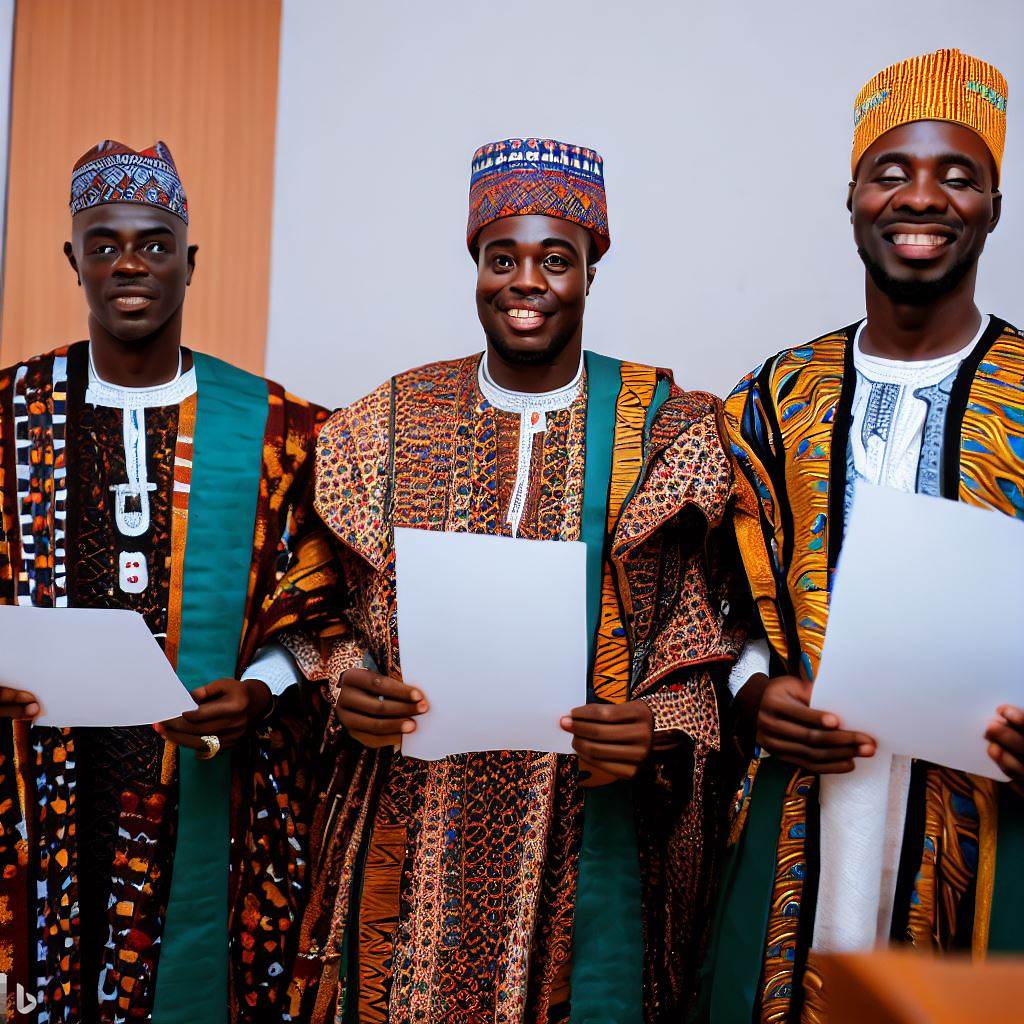Introduction
Understanding Intellectual Property Rights Law in Nigeria
Both individuals and businesses benefit from intellectual property rights, as they protect their time and effort in developing creations.
In Nigeria, the intellectual property rights law holds great importance for the country’s creative and innovative industries.
It is necessary to safeguard local creations and ideas, while also respecting and upholding international intellectual property within Nigeria.
The Nigerian Copyright Commission (NCC) is responsible for enforcing copyright law, which protects literary, artistic, and musical works.
The Patents and Designs Registry regulates patents, industrial designs, and trademarks. These bodies have been instrumental in safeguarding intellectual property rights and encouraging innovation in the country.
Furthermore, the Nigerian government has taken steps to update its intellectual property rights laws in line with global standards. In 2018, the government passed the Nigerian Copyright Amendment Bill, which aimed to address gaps and challenges in the existing copyright law.
This move demonstrates Nigeria’s commitment to fostering a favorable environment for creativity and innovation.
In essence, understanding intellectual property rights law is crucial for anyone who creates or uses any form of intellectual property.
In Nigeria, the law plays a vital role in encouraging innovation and protecting the rights of creators. As such, it’s essential for all individuals and businesses to stay informed about their intellectual property rights and their legal options for protecting them.
Read: Nigeria’s Fight Against Corruption: Law’s Critical Role
Types of Intellectual Property Rights in Nigeria
Intellectual property rights are legal rights that protect the creations of the human mind. Intellectual property rights include patents, copyrights, trademarks, and trade secrets.
The aim of these rights is to encourage innovation and creativity, offering creators incentives to produce original works without fear of unauthorized use.
In Nigeria, the Nigerian Copyright Act, the Nigerian Patents and Designs Act, and the Nigerian Trade Marks Act protect intellectual property rights.
Copyrights
A copyright is a legal right that protects original works of authorship such as literary, musical, and dramatic works, as well as computer software, databases, and other creative intellectual works.
Nigerian law recognizes copyright protection automatically upon the creation of the work and without the need for registration.
The copyright owner has the exclusive right to reproduce the work, distribute copies, and create derivative works. Copyrights in Nigeria last for the life of the author plus 70 years.
Patents
A patent is a legal right granted for an invention that is new, non-obvious, and useful. Nigerian law provides for the registration and protection of patents for inventions that are novel, inventive, and industrially applicable.
A patent holder has the exclusive right to prevent others from making, using, selling, or importing the patented invention without authorization. Patent protection in Nigeria lasts for a maximum of 20 years.
Trademarks
A trademark is a legal right that protects logos, symbols, or words that identify and distinguish goods and services.
Nigerian law provides for the registration and protection of trademarks. Owners of registered trademarks have exclusive rights to use, license, and prevent others from using confusingly similar marks in the course of trade.
Trademarks in Nigeria are protected for an initial period of 7 years, renewable indefinitely for periods of 14 years each.
Trade Secrets
A trade secret is a type of intellectual property right that protects confidential information, such as formulas, processes, techniques, and commercial strategies used by a business to gain a competitive advantage.
Nigerian law recognizes and protects trade secrets that meet certain requirements, including being secret and having commercial value. Trade secrets in Nigeria are protected indefinitely as long as they remain secret.
Furthermore, intellectual property rights are essential in promoting creativity and innovation by protecting the works of individuals and businesses.
In Nigeria, copyrights, patents, trademarks, and trade secrets are all recognized and protected under various laws.
It is important for creators and businesses in Nigeria to understand the requirements and benefits of each type of intellectual property right, and to take the necessary steps to protect and enforce those rights.
Read: Corporate Law in Nigeria: Opportunities and Challenges
Overview of Intellectual Property Rights Law in Nigeria
Nigeria recognizes the need to protect the creativity and ingenuity of individuals and businesses. This recognition has led to the enactment of various laws and regulations for the protection of intellectual property rights.
Let’s explore the legal framework for intellectual property rights in Nigeria and the laws and regulations that govern them.
The Legal Framework for Intellectual Property Rights in Nigeria
The Nigerian legal framework for intellectual property rights comprises several laws and regulations, with the Nigerian Copyright Act and Patent and Designs Act being the most significant.
The Nigerian Copyright Act safeguards literary, artistic, musical, and cinematographic works, protecting both Nigerian authors’ original works and foreign works published or exhibited in Nigeria.
This act grants automatic copyright protection upon work creation, lasting for the author’s lifetime plus 70 years after their death.
The Nigerian Patent and Designs Act provides protection for inventions and designs. It establishes the Patents and Designs Registry, which is responsible for processing and granting patents and designs.
The act grants exclusive rights to patent owners for a period of 20 years from the date of filing the patent application. It also provides protection for industrial designs for a period of 15 years.
Implications for Intellectual Property Rights in Nigeria
The implications of the Nigerian Copyright Act and Patent and Designs Act for intellectual property rights are enormous.
These acts provide a legal framework for protecting the creativity of individuals and businesses in Nigeria. They also provide a means for individuals and businesses to monetize their creativity.
However, despite the existence of these laws, intellectual property violations are still rampant in Nigeria.
This is partly due to the lack of awareness regarding intellectual property rights and the lax enforcement of intellectual property laws. As such, individuals and businesses must be proactive in protecting their intellectual property rights.
The legal framework for intellectual property rights in Nigeria is significant in protecting the creativity and ingenuity of individuals and businesses.
The Nigerian Copyright Act and Patent and Designs Act provide the legal foundation for protecting literary, artistic, musical, and cinematographic works, as well as inventions and designs.
They provide a means for individuals and businesses to monetize their creativity. However, awareness regarding intellectual property rights must be raised, and enforcement of intellectual property laws must be strengthened to curb intellectual property violations.
Read: Top Nigerian Lawyers: Pioneers and Modern Influencers
Enforcement of Intellectual Property Rights Law in Nigeria
Various laws, including the Copyright Act, the Patent and Designs Act, and the Trade Marks Act, protect intellectual property rights in Nigeria.
Enforcement poses challenges due to Nigeria’s large population and diverse market, despite legal protections.
An explanation of enforcement mechanisms and an overview of available legal remedies for infringed intellectual property rights follow.
Enforcement Mechanisms
The enforcement mechanisms for intellectual property rights in Nigeria include criminal and civil sanctions.
Criminal sanctions involve the prosecution of infringers, while civil sanctions involve seeking damages and injunctive relief in court.
The Nigerian government has established various agencies responsible for enforcing intellectual property rights, such as the Nigerian Copyright Commission, the Nigerian Trademarks, Patents and Designs Registry, and the Standards Organization of Nigeria.
The Nigerian Customs Service also plays a critical role in enforcing intellectual property rights.
The agency has the power to intercept and seize infringing goods at the border, preventing them from entering the Nigerian market.
The government has also established a Special Anti-Piracy Taskforce (APT) tasked with investigating and prosecuting intellectual property offenders.
Legal Remedies
Individuals and businesses whose intellectual property rights have been violated in Nigeria have various legal remedies available to them. These remedies include the temporary and permanent injunctions, damages, accounts of profits, and delivery-up.
The temporary and permanent injunctions prevent infringers from continuing to violate the intellectual property rights of the original creator.
Injunctions are usually granted alongside other remedies such as damages, accounts of profits or delivery-up. Damages represent the actual cost of the infringement of the intellectual property right and accounts of profit require the infringer to pay over the profits made from the infringing activity.
Delivery-up requires the infringing material to be surrendered and destroyed.
Additionally, alternative dispute resolution mechanisms such as mediation and arbitration provide an alternative to costly and time-consuming court proceedings.
Enforcing intellectual property rights in Nigeria requires the coordinated efforts of government agencies, businesses, and individuals.
The Nigerian government has set up institutions such as the Nigerian Copyright Commission and the Nigerian Trademarks, Patents, and Designs Registry.
Individuals and businesses can take legal action, such as seeking injunctions, claiming damages, and demanding delivery-up, to safeguard their intellectual property rights.
Alternative dispute resolution mechanisms offer a way to resolve these disputes outside the court system.
Read: The Evolution and History of Legal Professions in Nigeria

Challenges in Protecting Intellectual Property Rights in Nigeria
Intellectual property rights (IPR) refer to the legal ownership and protection of intangible assets like inventions, music, art, and software.
In Nigeria, individuals and businesses face several challenges in protecting their IPR, from piracy and counterfeiting to ineffective enforcement mechanisms.
Factors Contributing to Weak IPR Protection in Nigeria
- Corruption: Corruption is a major obstacle to IPR protection in Nigeria, as it undermines the rule of law. Government officials sometimes accept bribes to overlook piracy and counterfeiting activities.
- Insufficient Legal Resources: Nigeria’s intellectual property regime suffers from insufficient legal resources, including a dearth of trained lawyers and judges who specialize in IPR.
- Ineffective Enforcement Mechanisms: Even when IPR infringement is recognized, enforcement mechanisms are often inadequate. This is due to limited resources, inadequate training, and public sector inefficiency.
- Inadequate Awareness: Many individuals and businesses do not understand the importance of IPR and how it can be protected. This makes them vulnerable to infringement and limits their ability to take preventative or responsive measures.
Specific Challenges Faced by Individuals and Businesses in Nigeria
- Piracy and Counterfeiting: Piracy and counterfeiting of IPR is rampant in Nigeria, from books and music to pharmaceuticals and software. This deprives creators and innovators of income and undermines overall economic development.
- Cost of Litigation: Litigation costs can often be prohibitively expensive in Nigeria, particularly for individuals and small businesses. This makes it difficult for them to pursue legal action against infringers.
- Slow Enforcement Process: The enforcement of IPR in Nigeria can be time-consuming and slow, particularly in cases that are appealed or escalated through the court system. This delay can further exacerbate losses incurred by the aggrieved party.
- Inadequate Evidence Gathering: Evidence gathering is a significant challenge in IPR disputes, as the burden of proof is often on the plaintiff. This can be difficult in cases where the infringer has destroyed or hidden evidence.
- Globalization: The rise of digital commerce and the global economy has created new challenges for IPR protection in Nigeria. The ease with which goods can be imported and exported makes it difficult to control IPR infringement.
Possible Solutions to Improve IPR Protection in Nigeria
- Strengthening Legal Frameworks: Nigeria could strengthen its IPR protection by improving legal frameworks and increasing resources dedicated to this area of law enforcement.
- Increasing Public Awareness: Greater public awareness about IPR protection could help reduce piracy and counterfeiting. Initiatives like public service announcements, educational campaigns, and training programs could help improve awareness.
- Effective Enforcement: Effective enforcement mechanisms should be established and strengthened to deter infringers and ensure that IPR holders have access to adequate remedies.
- Regional Cooperation: Cooperation between Nigeria and other countries in the region, particularly those with stronger IPR protection, could help improve Nigeria’s own regime. A regional approach to IPR protection could be beneficial in creating a common framework to tackle the problem.
IPR protection is vital for economic growth and development, but Nigeria’s IPR regime faces significant challenges.
Corruption, lack of legal resources, ineffective enforcement mechanisms, limited awareness, and challenges faced by individuals and businesses all contribute to the problem.
Possible solutions to improve IPR protection in Nigeria include strengthening legal frameworks, raising public awareness, ensuring effective enforcement, and promoting regional cooperation.
Read: The Role of Legal Associations in Nigeria’s Law Practice
Conclusion
The law protects individuals and businesses who create original works, encouraging entrepreneurship, innovation, and investment.
By protecting intellectual property rights, Nigeria can foster a thriving economy and competitive creative industries.
Failure to protect IPR results in lost economic growth and disincentives for entrepreneurs and innovators.
Nigeria must prioritize the protection of intellectual property rights to stimulate innovation, creativity, and investment.
Individuals and businesses should safeguard their intellectual property, while the government must enforce the law to deter infringements.




